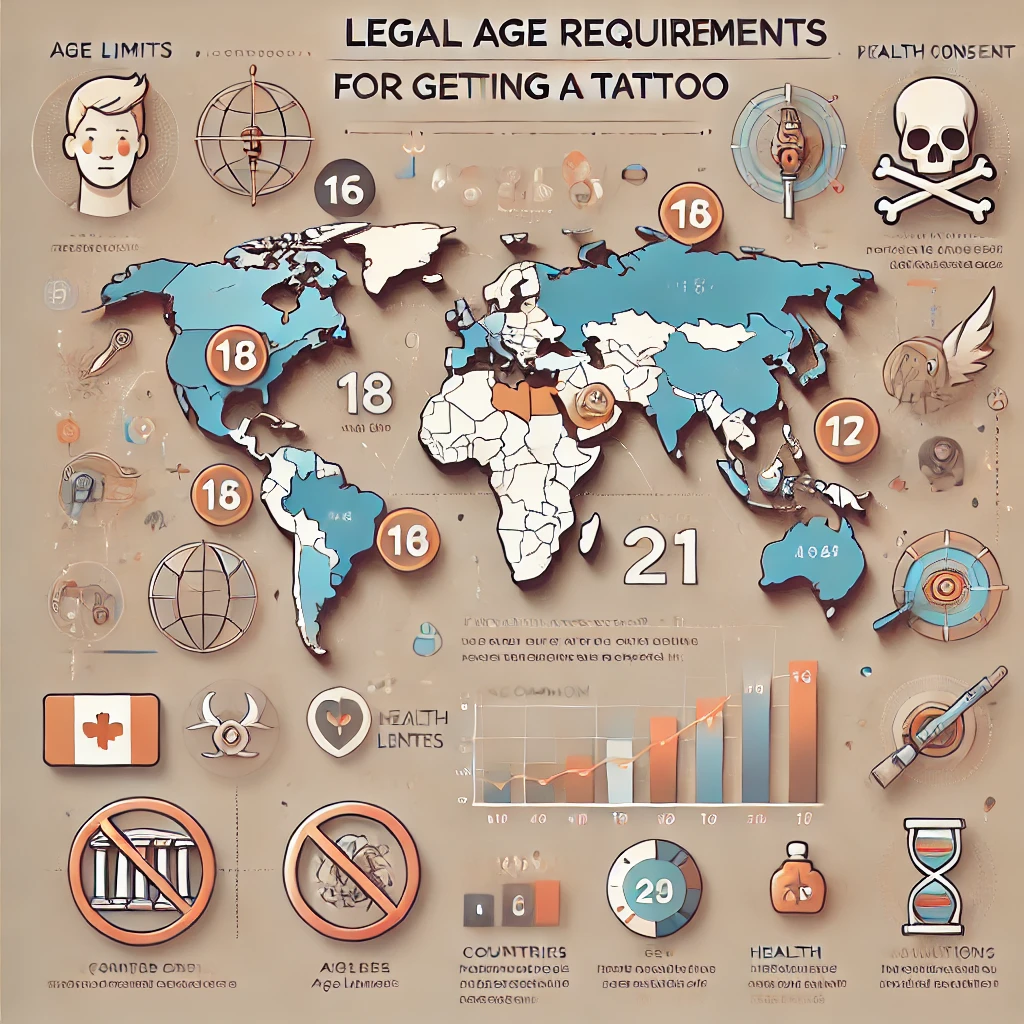
Getting a tattoo is a popular form of self-expression, but it’s also a significant decision that comes with some legal and health considerations. If you’re wondering at what age you can get a tattoo, the answer depends on several factors, including local laws, parental consent, and the policies of individual tattoo studios. Here’s a breakdown of everything you need to know about age restrictions and other important factors before getting inked.
Legal Age Requirements for Getting a Tattoo
The minimum age to get a tattoo varies from country to country, and even within different states, provinces, or regions. In most places, the legal age to get a tattoo is 18 years old. This is because 18 is the age at which a person is considered an adult and legally responsible for their decisions.
Here’s a closer look at the rules in some countries:
- United States: In most U.S. states, the legal age to get a tattoo without parental consent is 18. However, some states allow minors as young as 16 to get tattoos with the written consent of a parent or legal guardian. States like New York, Florida, and Texas follow this model, but others may have stricter laws or different requirements.
- United Kingdom: In the UK, the legal age to get a tattoo is 18, and it’s illegal for a tattoo artist to tattoo anyone under this age, even with parental consent.
- Canada: The minimum age for getting a tattoo in Canada varies by province. In some provinces, like Ontario, there is no set legal age, but most tattoo parlors require clients to be at least 18, or 16 with parental consent.
- Australia: The legal age for tattoos in Australia is 18. However, in some states, like Queensland, minors aged 16-17 can get a tattoo with parental consent.
- Europe: Many European countries, such as France, Germany, and Italy, have a minimum tattoo age of 18. However, some countries allow minors to get tattoos with parental consent.
In regions where minors are allowed to get tattoos with parental consent, there are typically strict guidelines. The parent or legal guardian often needs to be present during the tattooing process, and written consent is usually required. This ensures that both the minor and the parent fully understand the risks and responsibilities associated with getting a tattoo.
Even with parental consent, some tattoo studios may refuse to tattoo minors due to personal or company policies, as they may not feel comfortable tattooing someone who is underage, regardless of legal permission.
Why Age Restrictions Matter
There are several reasons why age restrictions are in place for getting a tattoo:
- Maturity and Decision-Making:
Tattoos are permanent, and choosing to get one is a big decision. Younger individuals may not fully understand the long-term commitment involved or may change their mind about their tattoo choice as they grow older. - Health Risks:
Tattooing involves breaking the skin with needles, which can lead to health risks like infections or allergic reactions if not done properly. Minors may be more vulnerable to these risks due to their developing immune systems. - Legal Responsibility:
The legal age of 18 marks the point at which individuals are generally considered responsible for their own decisions. By setting a legal age for tattoos, governments and businesses help ensure that people are fully accountable for the choices they make regarding their bodies.
Things to Consider Before Getting a Tattoo
Regardless of age, there are some important factors to think about before getting a tattoo:
- Design: Choose a design that has meaning to you, and take your time to think about whether it’s something you’ll still want in the future. Tattoos are permanent, and while removal is possible, it can be expensive and painful.
- Artist and Studio: Make sure the tattoo artist is reputable, experienced, and works in a clean, licensed studio. Look at the artist’s portfolio and read reviews to ensure their style aligns with your vision.
- Health: If you have any medical conditions or concerns, consult a doctor before getting a tattoo. Additionally, make sure you follow proper aftercare instructions to avoid infection or complications.
Conclusion
In most places, the legal age to get a tattoo is 18, but some regions allow minors to get tattoos with parental consent. Even with consent, it’s important to carefully consider whether you’re ready for the commitment, as tattoos are permanent and involve potential health risks. Always choose a reputable tattoo artist and take your time to select a design you’ll love for years to come

Great article! Very clear and informative about tattoo laws and important factors to consider.
We truly appreciate you taking the time to share your thoughts with us. Your feedback and insights help us grow and create even better content for you. It’s amazing to have such a supportive community like you engaging with our articles.
Keep sharing your views – we’re always eager to hear from you!
Warm regards,
The SOCIALINFOZONE Team